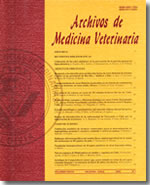Assessment of the risk for introduction of African horse sickness into South American southern cone countries via import of live animals
Main Article Content
Abstract
African Horse Sickness (AHS) is arguably one of three animal diseases that are exotic to countries in the Southern Cone of South America and that, if introduced into the region, would result in substantial economic and social consequences. This study shows the results of a quantitative risk assessment of the introduction of AHS into the region through the legal importation of horses from Europe, under the hypothesis of an undetected epidemic in the country of origin. Results suggest that the risk for introduction of AHS in the scenario assessed here is low, and that in the event of an epidemic in the country of origin, for those animals that are in transit when the epidemic is detected and given that the farm of origin was certified negative, a negative serological test in destination may be sufficient to lower the risk for introduction down to acceptable levels. These results also suggest that current legislation in the region is sufficient for preventing the introduction of the disease.

